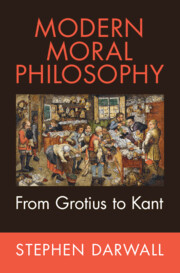Book contents
- Modern Moral Philosophy
- Modern Moral Philosophy
- Copyright page
- Dedication
- Contents
- Preface
- Acknowledgments
- Introduction
- 1 Grotius
- 2 Hobbes and Pufendorf
- 3 Locke and Cumberland
- 4 Spinoza, Cudworth, Shaftesbury, and Leibniz
- 5 Hutcheson and Butler
- 6 Hume and Smith
- 7 The British Rationalists and Reid
- 8 Rousseau and Kant
- Works Cited
- Index
5 - Hutcheson and Butler
Published online by Cambridge University Press: 10 June 2023
- Modern Moral Philosophy
- Modern Moral Philosophy
- Copyright page
- Dedication
- Contents
- Preface
- Acknowledgments
- Introduction
- 1 Grotius
- 2 Hobbes and Pufendorf
- 3 Locke and Cumberland
- 4 Spinoza, Cudworth, Shaftesbury, and Leibniz
- 5 Hutcheson and Butler
- 6 Hume and Smith
- 7 The British Rationalists and Reid
- 8 Rousseau and Kant
- Works Cited
- Index
Summary
Hutcheson and Butler were contemporaries whose best-known works appeared within a year of one another. Although they had similar intellectual temperaments and styles, their philosophical approaches differed in important ways that reverberated through thinkers that followed. Both were sharply analytical, and both shared a keen insight into moral psychology. Moreover, both laid great stress on the psychology of moral judgment. Hutcheson called this, following Shaftesbury, “moral sense,” and Butler referred to it alternately as the “principle of reflection” or “conscience.” For both, moral judgment involves the human capacity to (more or less successfully) reflect upon and respond affectively to motives, characters, and actions in dispassionate impartial way. However, the role of moral reflection for these two philosophers is profoundly different. For Hutcheson, it is an observer’s moral sense that enables a person to make moral evaluations of motivation and actions, but these evaluations are not self-reflexive – the agent is not evaluating their own, or even others’, moral sense. For Butler, on the other hand, conscience is a moral faculty by which agents crucially make judgments of themselves, judgments they employ to shape their own actions. Conscience is action-guiding for Butler in a way that moral sense is not for Hutcheson.
Keywords
- Type
- Chapter
- Information
- Modern Moral PhilosophyFrom Grotius to Kant, pp. 165 - 200Publisher: Cambridge University PressPrint publication year: 2023

